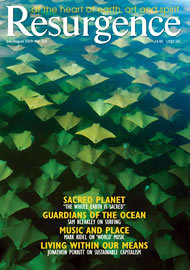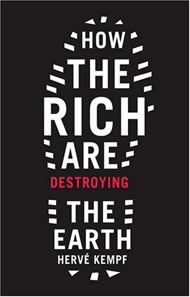IF THIS NEWLY translated book had been written by a hard-core activist it might have been dismissed as a polemic from the fringe, but French journalist Hervé Kempf is environmental editor of Le Monde. He is an enormously well-respected commentator. So it is disturbing to find the state of the world rendered so starkly in this vitally important book. At times it had me grasping for reasons to continue living, so gloomy was its overview.
Kempf’s thesis is admirably presented, building up its case gradually. First, the most important links are established. Initially he is on familiar ground – I imagine that most people reading the book will be aware of the potential for catastrophic feedback loops causing runaway climate change. These nightmare scenarios, once considered the ground of science fiction, are now accepted science.
The case continues to build: land use increases disproportionately to population; rubbish fills the oceans; toxic chemicals concentrate in the food chain. We have become fixated on climate change, but it is not the totality of the crisis we face. Everything is linked. I guess we knew that too, but few want to dwell on what it means.
There is no dichotomy: social and environmental problems are simply manifestations of the same thing. If we attempt to tackle one without the other, we are doomed to failure.
This is all building towards one of the most important ideas in the book. Again, I think it is one that many of us feel, but few have articulated so well. The link between social and environmental problems becomes clear, yet there is no coherent challenge to the crises. Socialism is based on materialism and lacks ecological awareness and ecologists have to... well, I leave it to Kempf: “Naïve comrades, there are evil men on Earth. If one wants to be an ecologist, one must stop being a half-wit.” No-one could accuse Kempf of trying to curry favour! It is the “evil men” who are happy for environmentalists to argue that we are ‘all in the same boat’. What is ignored is that the rich have life rafts.
Kempf predicts much of the recent turmoil in the banking system. And he does so with a caustic turn of phrase. “Like a junkie who can stay standing only by shooting more heroin, the United States, doped-up on hyper-consumption, staggers before it drops.” Highly prescient then, he sees the system as clearly unsustainable.
It feels like a long time ago, but in the early 1990s I remember confronting an international advocate of ‘sustainable development’ – and getting him to admit that it was obviously impossible. Well, it is pleasing to see Kempf tackle it with customary zest. He describes it as “a semantic weapon used to shove aside the dirty word, ‘ecology’”.
The key argument, though, is less intellectual and more prosaic – in fact Kempf has given new life to the line from the late Utah Phillips, “The Earth is not dying, it is being killed, and those who are killing it have names and addresses.” He identifies those responsible and demands that they be challenged.
The damage caused by the rich is not simply a matter of their hyper-consumption. If that were all, then we would not be in such a state. Referring to the economist Thorstein Veblen’s writings of 1899, Kempf expounds the theory that the problem of the rich comes from the human desire to emulate those we see as better off than ourselves. We look up the consumptive strata and identify with those just out of reach – and spend our lives striving to be like them. Keeping up with the Joneses takes on a totally new dimension.
Kempf has done a wonderful job of forcing the environmental movement to grow up. A healthy, though at times rather depressing, dose of political theory is the key to that. For example, he tackles the persistent worship of growth, despite it being obviously unsustainable. Why is it not challenged? “Because the pursuit of material growth is the oligarchy’s only means of getting societies to accept extreme inequalities without questioning them.”
Perhaps surprisingly, this book is not without hope. It is just that the hope is quite small. Kempf hopes that the political left will be reborn “uniting the causes of inequality and the environment…” It would be fascinating to hear what he makes of the current shifts in economics and politics – would he draw comfort from Obama and the credit crunch? Perhaps there truly is hope and perhaps Kempf is right: that “the desire to remake the world is being reborn.” •
Hugh Warwick is the author of A Prickly Affair: My Life with Hedgehogs, published by Allen Lane.








